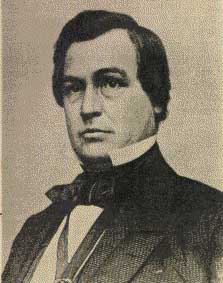- James W. Denver
Infobox Officeholder
name = James W. Denver

caption =
order = 2ndSecretary of State of California
term_start = 1853
term_end = 1855
predecessor =William Van Voohies
successor =Charles H. Hempstead
birth_date =October 23 ,1817
birth_place = Winchester,Virginia
death_date =August 9 ,1892
death_place =Washington, D.C.
party = Democratic
spouse =
profession =Politician ,Lawyer
religion =
footnotes =James William Denver (
October 23 ,1817 –August 9 ,1892 ) was an American politician, soldier, and lawyer. He served in theCalifornia state government, as an officer in theUnited States Army in two wars, and as a Democratic member of theUnited States House of Representatives from California. He served as secretary and Governor of theKansas Territory during the struggle over whether or notKansas would be open toslavery . The city ofDenver, Colorado , is named after him.Early life and career
James W. Denver was born near
Winchester, Virginia . He attended public schools and moved toOhio with his parents in 1830, settling near Wilmington. In 1841 he taught school inMissouri , and in 1844 he graduated from the law school of theUniversity of Cincinnati . He was admitted to the bar and practiced law nearXenia, Ohio . He moved toPlatte City, Missouri , in 1845, where he continued his law practice.In 1847, during the
Mexican-American War , he recruited a company for the 12th U.S. Volunteer Infantry and was commissioned a captain, serving under GeneralWinfield Scott . After the war in 1850, Denver traveled toCalifornia , where he became a trader. Denver killed newspaper editorEdward Gilbert in aduel onAugust 2 ,1852 . Later that same year, he was elected to theCalifornia State Senate . He was later appointed as Secretary of State of California. In 1854 he was elected to theUnited States Congress as representative from California, serving from March 4, 1855-March 3, 1857. He was not a candidate for renomination in 1856. OnApril 17 ,1857 , PresidentJames Buchanan appointed him as Commissioner of Indian Affairs.On
June 17 ,1857 , he resigned as Commissioner of Indian Affairs and was appointed by Buchanan as Secretary of the Kansas Territory. In December 1857 he was appointed as Territorial Governor. On the day that Denver assumed the territorial governorship, citizens in the territory voted on theLecompton Constitution , which opened the territory to slavery. The vote offered a choice only between full slavery and limited slavery in the territory and was thus largely boycotted byFree-Staters who were in favor of abolishing slavery. The pro-slavery constitution passed by an overwhelming margin. Later it was discovered that several thousand votes were cast fraudulently by "border ruffians " who had crossed into the territory fromMissouri in order to cast pro-slavery ballots (The vote was overturned by a subsequent election in August 1858, and Kansas was later admitted to the Union in 1861 asfree state . SeeBleeding Kansas for details.).In November 1858, while Denver was still serving as territorial governor,
William Larimer, Jr. , a land speculator from Leavenworth, planted the townsite of "Denver City" along theSouth Platte River in Arapaho County in westernKansas Territory (the present-day state ofColorado ). Larimer chose the name "Denver" to honor the current territorial governor with the intention that the city would be chosen as the county seat of Arapaho County.Denver retired as territorial governor in November 1858 and was reappointed Commissioner of Indian Affairs, serving until his resignation on
March 31 ,1859 .Civil War and later career
A few months after the start of the
American Civil War in early 1861, PresidentAbraham Lincoln commissioned Denver a brigadier general in the volunteer army onAugust 14 . During early 1862, Denver commanded the 3rd Brigade/5th Division under Maj. Gen.William T. Sherman during theSiege of Corinth . In November 1861, he was ordered to report toFort Scott in Kansas. In December, he assumed command of all Federal troops in Kansas. Denver subsequently served on garrison duty in that state until his resignation from the Union Army onMarch 5 ,1863 .After the end of the war, Denver practiced law in
Washington, D.C. , andWilmington, Ohio . He served as a delegate to Democratic National Convention in 1876, 1880, and 1884. He was mentioned as possible Democratic presidential nominee in 1876 and 1884, although his name was never offered into formal nomination.Denver reportedly visited
Denver, Colorado in 1875 and 1882, but complained that his visits received little attention from the residents of the city named after him. [Robert L. Brown (1985) "The Great Pikes Peak Gold Rush", Caldwell, Ida.: Caxton, p.64]He died in Washington, D.C. in 1892 and is buried in Sugar Grove Cemetery in
Wilmington, Ohio .His son,
Matthew R. Denver , was aU.S. Congressman from Ohio from 1907–1913.External links
* [http://bioguide.congress.gov/scripts/biodisplay.pl?index=D000261 U.S. Congress Biography of James William Denver]
* [http://ead.diglib.ku.edu/xml/ksrl.kc.denverjames.html Denver's papers at the University of Kansas]References
Further reading
* Barns, George C., "Denver, the Man; the Life, Letters and Public Papers of the Lawyer, Soldier and Statesman." Wilmington, Ohio, 1949.
* Cook, Edward Magruder (ed.), "Justified by Honor: Highlights in the Life of General James William Denver". Falls Church, Virginia: Higher Education Publications, 1988.
Wikimedia Foundation. 2010.
